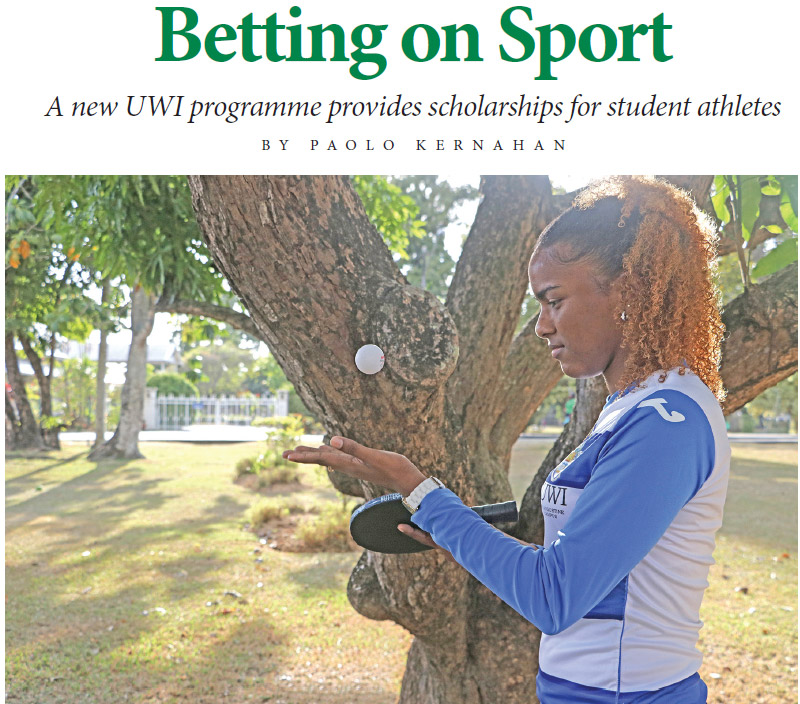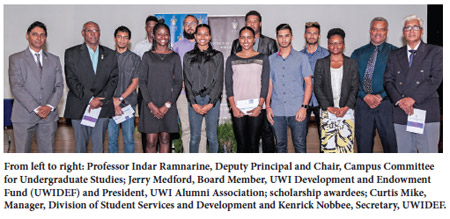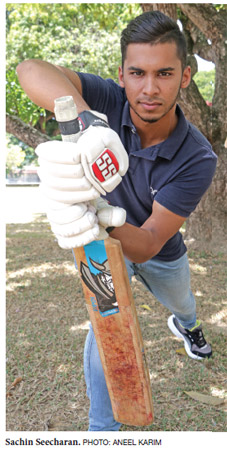

A nine-year-old girl takes up her position at the white-bordered edge of a green table. She stares intensely at the low net on the short horizon, clutching her table tennis racket in a pen-hold grip. She drops the weightless white ball onto the paddle's pimpled surface and a spirited rally begins.
UWI social sciences student Brittany Joseph is a long way from that little girl who became enamoured of the clackety clack cadence of table tennis. For this UWI sportswoman of the year 2018/19 though, her affection for the sport has only flourished. What began for Joseph as ping-pong is starting to look like the road to Tokyo 2024...the Summer Olympics. Big things have small beginnings. This is thanks, in part, to a commitment by the university to boost the sporting ambitions of students at the institution.
This commitment is echoed in a student athlete policy that lays out an established framework for students to go for sporting gold in national, regional and international competitions.
They're reaching for the stars while keeping their feet on solid academic ground. The university is, however, also walking the talk through a sports scholarship programme geared towards giving student athletes much needed financial assistance to chase their dreams on the court, pitch, field or tennis table.
In 2018, Deputy Principal Professor Indar Ramnarine approached the UWI Development and Endowment Fund (UWIDEF). His goal was to prod them to finance ten sports scholarships at $5,000 each. With no arm-twisting necessary, the UWI-DEF was down with cause. UWI received outstanding support from UWIDEF Chair Nigel Romano and Secretary Kenrick Nobbee.
Thus was born their sports scholarship programme. The ten, one-year scholarships were provided to four young women and six young men in areas such as football, cycling, swimming, volleyball, basketball, track and field, cricket and table tennis.
To be sure, the sum of $5,000 is modest. The underpinning philosophy of the scholarship programme, however, is anything but. For Professor Ramnarine, this investment has positive repercussions for the wider society well beyond a campus boundary. This is sport with a vision to build society.
When is a sport bigger than the game?
 For the Deputy Principal, the recently minted UWI Faculty of Sport (launched in July 2017) and sports scholarship programme are significant firsts for the university. It's an idea rooted in more unassuming objectives – creating a sporting environment that bolsters the physical well-being of students. It fosters a well-rounded academic ecosystem, one that enhances the chrysalis phase of students' lives. Sport as positive influence in human development isn't, in itself, a spanking new concept. As Professor Ramnarine points out, however, there is a grander vision at play here. For the Deputy Principal, the recently minted UWI Faculty of Sport (launched in July 2017) and sports scholarship programme are significant firsts for the university. It's an idea rooted in more unassuming objectives – creating a sporting environment that bolsters the physical well-being of students. It fosters a well-rounded academic ecosystem, one that enhances the chrysalis phase of students' lives. Sport as positive influence in human development isn't, in itself, a spanking new concept. As Professor Ramnarine points out, however, there is a grander vision at play here.
“The global sport industry is estimated at approximately $145 billion and growing. It's an area where an athlete from the smallest island can compete globally and become a giant on the world stage. It is also linked to a number of other industries, namely entertainment, fashion, medicine and tourism."
What Professor Ramnarine is talking about is the long game. He views sport as a viable industry for T&T, germinating lucrative athletic careers through a fledgling scholarship programme. Pro athletes are going to need specialist coaches, medical practitioners, financial advisers; The UWI Deputy Principal is looking at the entire field of play, not merely one innings.
Ours is a small nation with a need for an alternative model of economics, one in which there are several contributors to economic growth and stability. The potential of sport to become a major player in a national diversification thrust is nothing to sniff at.
The Faculty of Sport at The UWI very much sees itself as a driving force in this regard. It's challenging the institution to lead the charge in research, education and learning to advance sport as a new engine of economic growth. That's something sorely critical to a traditionally two-stroke economy that's aching for an upgrade. The university is hoping its Faculty of Sport and scholarship programme will attract the researchers, top tier coaches, athletes and medical professionals, as well as investors with an eye for what's around the bend.
Of course, The UWI can't hold a candle to the investments tertiary institutions in others countries are able to manage. As mentioned earlier, big things have small beginnings.
The institution envisions a more robust economy and multi-faceted society. Every vision must start somewhere. These initiatives are that first, tentative step.
 Changing perceptions, building discipline Changing perceptions, building discipline
For Sachin Seecharan, cricket was an ever-present influence in his early life. The game was as fundamental as breathing to his family. Additionally, it was never lost on him how his cricketing heroes were able to translate a passion for the game into viable careers. From cricket with a coconut branch on a blustery beach to accolades at Lord's Cricket Ground; if you're going to dream, there's not much point to merely dreaming of a softer pillow.
As a social sciences student, Sachin appreciates that more people are growing to accept sports as a major element of the university experience. UWI is escaping prevailing perceptions as an institution that only favours erudition. It's proving itself to be more inclusive of all types of individuals in search of higher learning as it celebrates the development of both mind and body.
As a scholarship recipient, Seecharan has his sights set on the Trinidad and Tobago senior team as well as the Combined Colleges and Campuses (CCC) cricket team. For this up and coming cricketer, $5,000, though small to some, enabled him to purchase some of his gear and get him in the game.
Sachin also sees the discipline that sport demands as the sort of lifelong programming that will serve him well after his university days are over.
The UWI scholarship programme, while designed to give aspiring athletes a modicum of support, is not meant to compete with the demands of academics. Awardees are expected to hit the books as much as they hit their high scores. Maintaining a GPA of 3.0 or higher while maintaining active participation in their chosen sport is a delicate balancing act awardees must manage. Deputy Principal Ramnarine explains that the Student Athlete Policy is designed to help students attain that crucial balance. Awardees are excused from some classes so they might fit in competition schedules. The policy also embraces alternative forms of teaching, such as tutorials and online outreach to strike a balance between athletics and academics. As The UWI works to create an environment in which both facets of the developmental process can co-exist, it is also focused on the future of the programme.
Building on a strong sporting foundation
There can be no question that students are keen on the sports scholarship programme. When it was first advertised, there were 23 applicants for the ten available scholarships. The ten eventual awardees met the criteria for qualification without breaking a sweat. For Professor Ramnarine, the lead champion of the initiative, the main hurdle is a scarcity of resources. The UWI remains committed to continuing the scholarship programme through UWIDEF. With 80 per cent of the bursaries offered by the university coming from the public sector, it is hoped that sport can also get favourable consideration. As such, The UWI remains open to sponsorship from the wider community and the private sector to further the big picture objectives of the Faculty of Sport.
For table tennis champ Brittany Joseph, and cricketer Sachin Seecharan, today it's Trinidad and Tobago, tomorrow it's the world. But then, you may have read this somewhere before – big things have small beginnings.
|





